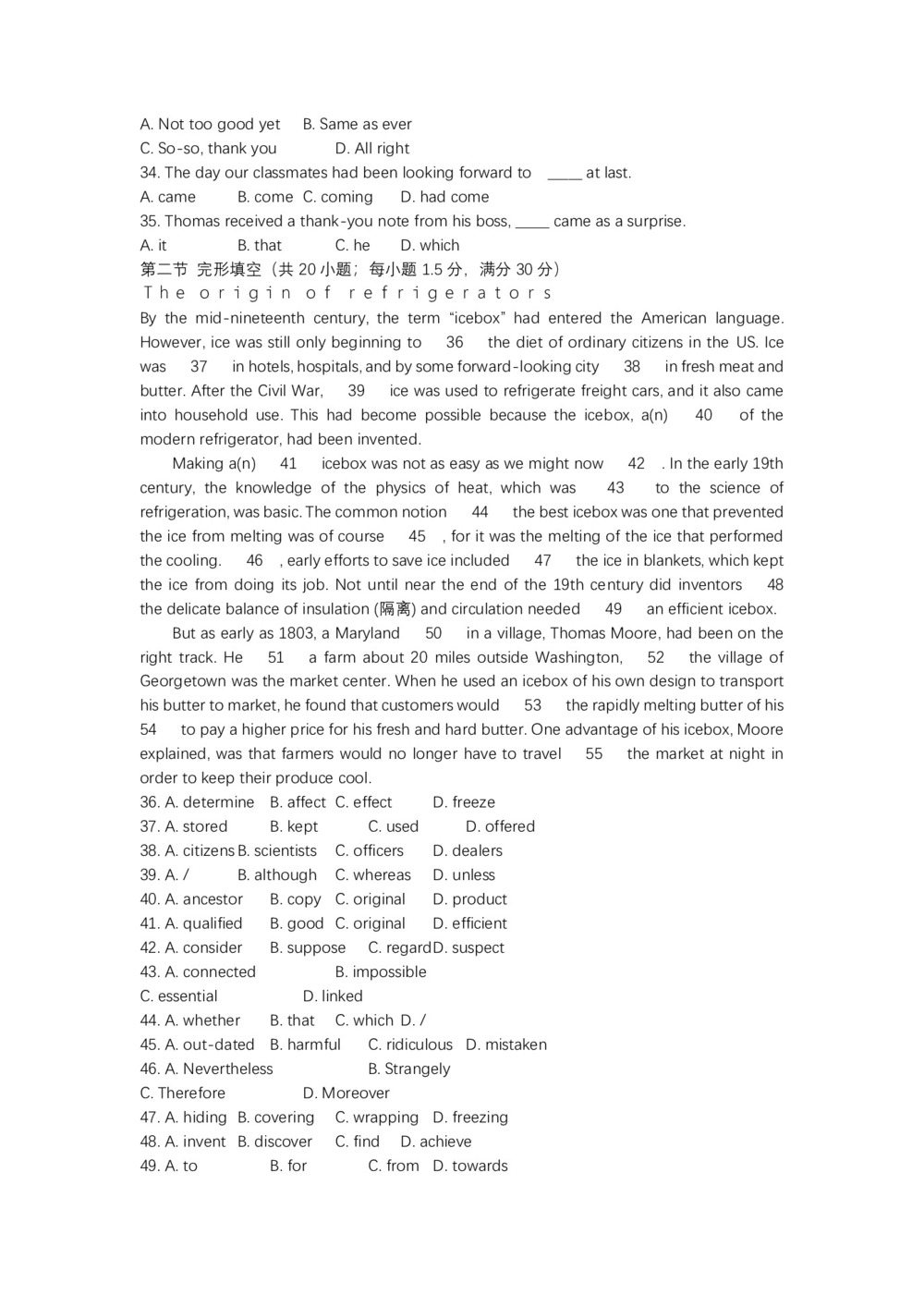
A. Not too good yet B. Same as ever
C. So-so, thank you D. All right
34. The day our classmates had been looking forward to _____ at last.
A. came B. come C. coming D. had come
35. Thomas received a thank-you note from his boss, _____ came as a surprise.
A. it B. that C. he D. which
第二节 完形填空(共20小题;每小题1.5分,满分30分)
The origin of refrigerators
By the mid-nineteenth century, the term "icebox" had entered the American language. However, ice was still only beginning to 36 the diet of ordinary citizens in the US. Ice was 37 in hotels, hospitals, and by some forward-looking city 38 in fresh meat and butter. After the Civil War, 39 ice was used to refrigerate freight cars, and it also came into household use. This had become possible because the icebox, a(n) 40 of the modern refrigerator, had been invented.
Making a(n) 41 icebox was not as easy as we might now 42 . In the early 19th century, the knowledge of the physics of heat, which was 43 to the science of refrigeration, was basic. The common notion 44 the best icebox was one that prevented the ice from melting was of course 45 , for it was the melting of the ice that performed the cooling. 46 , early efforts to save ice included 47 the ice in blankets, which kept the ice from doing its job. Not until near the end of the 19th century did inventors 48 the delicate balance of insulation (隔离) and circulation needed 49 an efficient icebox.
But as early as 1803, a Maryland 50 in a village, Thomas Moore, had been on the right track. He 51 a farm about 20 miles outside Washington, 52 the village of Georgetown was the market center. When he used an icebox of his own design to transport his butter to market, he found that customers would 53 the rapidly melting butter of his 54 to pay a higher price for his fresh and hard butter. One advantage of his icebox, Moore explained, was that farmers would no longer have to travel 55 the market at night in order to keep their produce cool.
36. A. determine B. affect C. effect D. freeze
37. A. stored B. kept C. used D. offered
38. A. citizens B. scientists C. officers D. dealers
39. A. / B. although C. whereas D. unless
40. A. ancestor B. copy C. original D. product
41. A. qualified B. good C. original D. efficient
42. A. consider B. suppose C. regard D. suspect
43. A. connected B. impossible
C. essential D. linked
44. A. whether B. that C. which D. /
45. A. out-dated B. harmful C. ridiculous D. mistaken
46. A. Nevertheless B. Strangely
C. Therefore D. Moreover
47. A. hiding B. covering C. wrapping D. freezing
48. A. invent B. discover C. find D. achieve
49. A. to B. for C. from D. towards
-
相关教案下载
- 12019-2020学年度人教版必修五Unit 3 Life in the futurePeriod2Language points学案(6页word版)
- 22019-2020学年度人教版必修五Unit 3 Life in the futurePeriod2Language points学案(12页word版)
- 32019-2020学年度人教版必修五Unit 3 Life in the futurePeriod2Language points学案(12页)
- 42019-2020学年度人教版必修5 Unit3 Life in the futurePeriod2Language points学案(4页word版)
- 52019-2020学年度人教版必修五Unit 3 Life in the futurePeriod5Using language 学案(11页word版)
- 62019-2020学年度人教版必修5 Unit3 Life in the futurePeriod2 Language points学案(6页word版)
- 72019-2020学年度人教版必修五Unit 3Life in the futurePeriod 5Using Language教案(11页word版)
- 82019-2020学年度人教版必修五Unit 3Life in the futurePeriod 3Learning about Language教案(11页word版)
- 92019-2020学年度人教版必修5 Unit3 Life in the futurePeriod5Using language学案(11页word版)